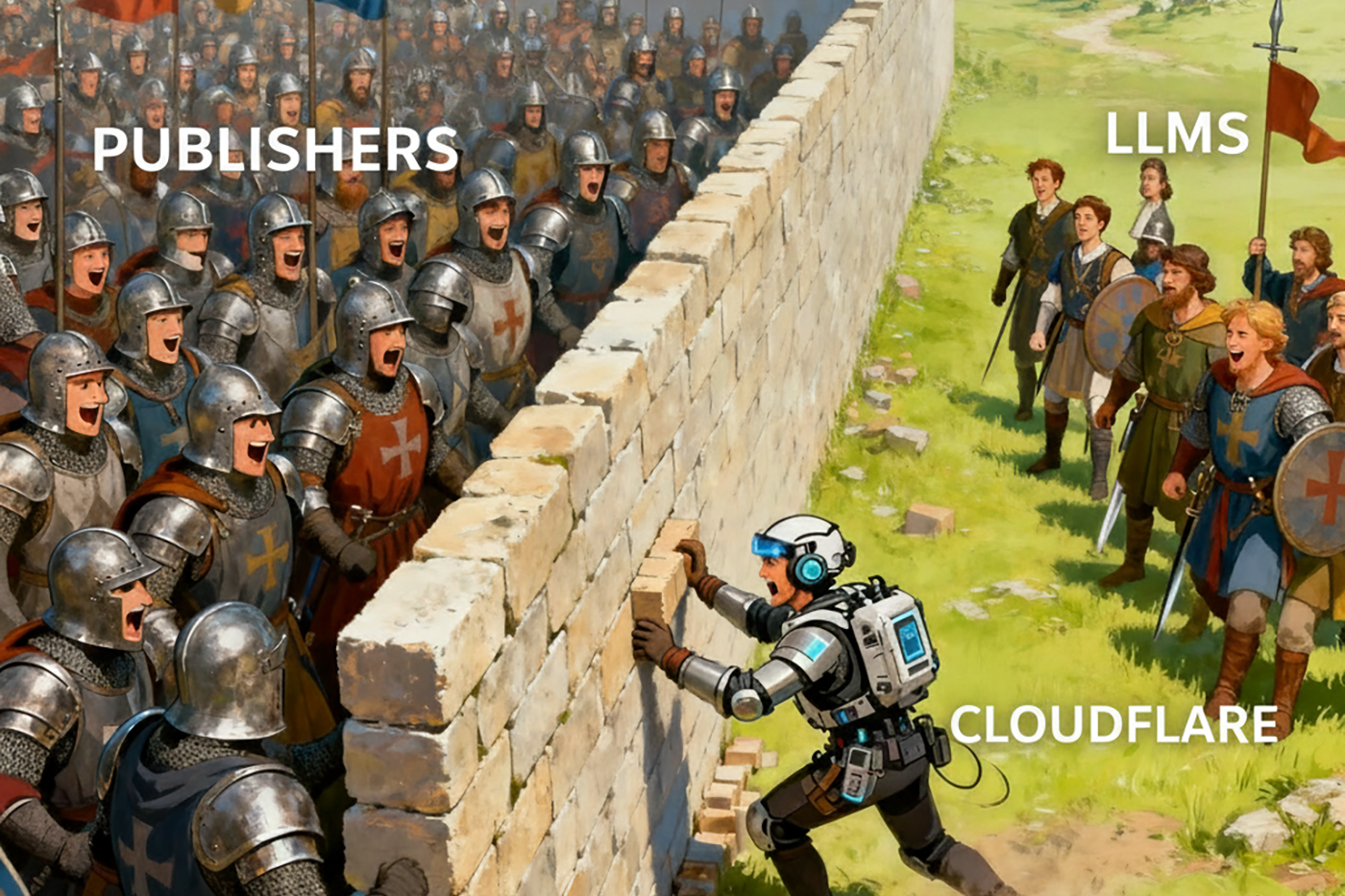The Content War: Cloudflare’s Bold Challenge to Google’s AI Dominance

The digital landscape witnessed another seismic shift in September when Cloudflare, the infrastructure giant powering 20% of global internet traffic, announced a new weapon in the escalating battle between content creators and AI companies. Their latest salvo: a feature designed to block Google's AI Overviews while preserving traditional search visibility—essentially offering publishers a way to have their cake and eat it too.
The Great Content Dilemma
The story begins with a fundamental betrayal of the web's original social contract. For decades, publishers operated under a simple bargain: create quality content, let search engines crawl it, and receive valuable traffic in return. This symbiotic relationship fueled the open internet's growth and sustained countless businesses.
But then came the AI revolution, transforming this delicate ecosystem into what many now call "the great content robbery". Companies like OpenAI, Google, and Anthropic began systematically harvesting web content to train their large language models, often without permission or compensation. The numbers tell a stark story: publishers report traffic declines of up to 80% since AI search features launched, with some experiencing click-through rate drops from 5.1% to just 0.6%.
The most damaging blow came from Google's AI Overviews, which debuted in May 2024. These AI-generated summaries appear at the top of search results, directly answering user queries without requiring clicks to original sources.
Research from Pew Center revealed that only 1% of users click through to source websites when AI Overviews appear
effectively creating what industry experts call a "zero-click" environment where information consumption ends at Google.
Cloudflare's Strategic Evolution
Cloudflare didn't arrive at this confrontation overnight. The company has been methodically building its anti-AI scraping arsenal since September 2024, when it first introduced one-click AI crawler blocking. By July 2025, it had escalated to blocking AI crawlers by default for all customers—a move affecting millions of websites simultaneously.
The company's latest innovation, the Content Signals Policy announced in September 2025, represents perhaps the most sophisticated attempt yet to give publishers granular control over their content.
Your content, your choice how it’s used. Today we publish a new, freely available license that lets you set the permissions for exactly how search and AI crawlers can consume your content. https://t.co/ZvIsZefYXJ
— Matthew Prince 🌥 (@eastdakota) September 24, 2025
"Every AI answer engine should have to play by the same rules," declared Cloudflare CEO Matthew Prince. "Google combines its crawler for search with its AI answer engines, which gives them a unique and unfair advantage."
The timing is no coincidence. Publishers have been increasingly vocal about their frustration, with the Independent Publishers Alliance filing antitrust complaints against Google in both the EU and UK. These legal challenges claim Google is abusing its market dominance by forcing publishers into an impossible choice: allow unlimited AI usage or disappear from search entirely.
The Players and Their Strategies
Publishers: Fighting for Survival
Publishers find themselves in an existential crisis. Data from Digital Content Next shows median referral traffic from Google Search down 10% in just eight weeks, with some publishers experiencing losses exceeding 25%. The impact extends beyond mere traffic—it's decimating the advertising revenue model that has sustained online journalism for decades.
Their strategy has evolved from passive resistance to active rebellion. Major publications like The New York Times have blocked AI crawlers entirely and pursued legal action. Others are demanding usage-based compensation rather than one-time licensing fees. The goal is clear: establish a sustainable economic model where content creators receive fair compensation for their work.
Cloudflare: The Infrastructure Kingmaker
Cloudflare's positioning is masterful—it's becoming the internet's referee in the AI wars. By controlling traffic for millions of websites, the company wields unprecedented power to enforce new rules. Its pay-per-crawl initiative, currently in beta, could fundamentally reshape how AI companies access content.
The business logic is compelling: while traditional web crawlers drive traffic back to publishers, AI crawlers extract value without reciprocal benefit. Cloudflare's data reveals that OpenAI generates 750 times less referral traffic than traditional Google searches, while Anthropic trails at 30,000 times less. This imbalance demands correction, and Cloudflare positions itself as the solution.
Google: Defending the Castle
Google faces a delicate balancing act. Its search advertising generated $54 billion in Q2 2025, but this success increasingly depends on keeping users within Google's ecosystem rather than sending them to external sites. AI Overviews serve this strategy perfectly—they provide immediate answers while creating new advertising opportunities within AI-generated responses.
The company's internal documents, revealed during antitrust proceedings, show Google deliberately chose not to give publishers opt-out options for AI Overviews because it's "evolving into a space for monetisation". This admission reveals Google's true priority: maximizing revenue from AI features, even at publishers' expense.
Google's response to Cloudflare's latest move has been notably muted. The company received advance notice of the Content Signals Policy but has made no commitment to honor the new directives. This silence speaks volumes—acknowledging the policy would legitimize publishers' claims for greater control, while ignoring it risks regulatory backlash.
The Economics of Disruption
The financial stakes are enormous. Anthropic's recent $1.5 billion settlement with authors—the largest copyright recovery in U.S. history—demonstrates that courts are willing to impose massive penalties for unauthorized content use. This precedent is already reshaping industry behavior, with AI companies rushing to secure licensing deals rather than risk similar lawsuits.
OpenAI has signed partnerships with over 30 major publishers, including substantial agreements worth $25 million with Reuters and $16 million annually with Dotdash Meredith. However, these deals are evolving from one-time payments to usage-based models that more accurately reflect the ongoing value AI companies extract from publisher content.
The advertising landscape is simultaneously transforming. Google claims AI Overviews generate equivalent ad revenue to traditional search results, but this metric obscures the fundamental shift occurring: revenue is increasingly concentrated within Google's own properties rather than being distributed across the web ecosystem.
Predicting the Future
The trajectory appears clear: we're witnessing the emergence of a new internet economy where permission and compensation replace the old model of free access. Several scenarios seem likely:
For Publishers: Those who adapt quickly will thrive by diversifying revenue streams and negotiating favorable AI licensing terms. Subscription revenue is already growing 14.4% year-over-year as publishers reduce dependence on advertising. However, smaller publishers lacking negotiating power may struggle to survive the transition.
For Cloudflare: The company is positioning itself as the essential infrastructure for the AI-controlled web. Success here could establish Cloudflare as the de facto gatekeeper for AI-content relationships, generating substantial recurring revenue from both publishers and AI companies seeking access to premium content.
For Google: The search giant faces mounting pressure from multiple directions—regulatory scrutiny, publisher revolts, and infrastructure providers like Cloudflare wielding new power. Google's response will likely involve grudging concessions to maintain publisher relationships while aggressively defending its AI capabilities through legal and technical means.
The endgame appears to be a more structured, permission-based internet where content usage rights are explicitly negotiated rather than assumed. This transformation echoes the music industry's evolution from Napster's chaos to today's streaming licensing models.
Within 12-18 months, expect to see standardized frameworks for AI content licensing, possibly mandated by regulation in key markets. Publishers will gain meaningful control over their content's AI usage, but they'll also need to adapt to a world where traditional search traffic continues declining.
The stakes couldn't be higher: this battle will determine whether the internet remains an open ecosystem supporting diverse content creators, or evolves into a walled garden dominated by a few AI platforms. Cloudflare's latest move suggests the content creators are finally fighting back—and they have powerful allies in their corner.
